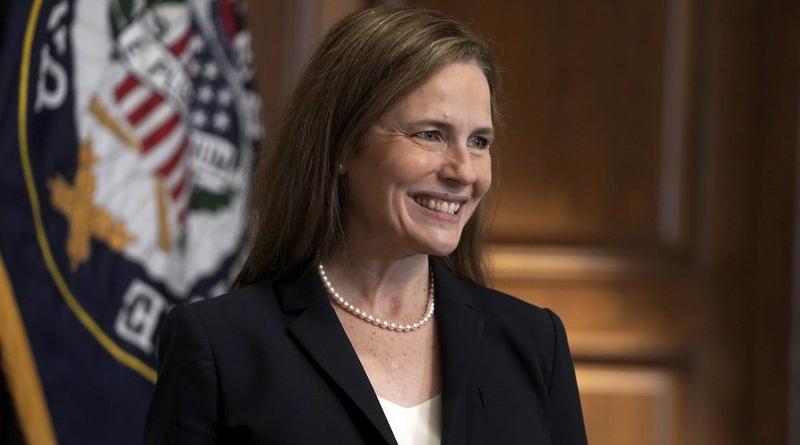How Amy Coney Barrett’s appointment to Supreme Court could impact climate crisis fight for decades.

Last minute Trump pick seals conservative domination of America’s highest court, causing shockwaves through environment movement.
The US Senate has voted to confirm Donald Trump's pick Amy Coney Barrett for a lifetime appointment on the Supreme Court, causing alarm among scientists and those concerned about the worsening climate crisis.
Ms Barrett, a 48-year-old Catholic, has indicated she does not necessarily accept the international scientific consensus on humanity’s impact on the climate.
Earlier this month she said she does not hold “firm views” on climate change, and described it as a “very contentious matter of public debate”.
This assessment sparked significant concern over her ability to evaluate evidence.
Just eight days before the US election, her appointment, following the death of Ruth Bader Ginsburg at 87, shifts the long-term make-up of the Supreme Court judges firmly to the right, with major ramifications for the future climate on our planet.
The lifetime appointment system means the makeup of America’s highest court is likely to remain unaltered possibly for decades, affecting the ability of a Biden presidency, or any other environmentally sympathetic administration, to pass laws to protect the natural world.
Ms Barrett’s appointment comes at a critical time in the fight against global greenhouse emissions and other efforts to protect the natural world and stave off climate breakdown.
If and when climate policy issues reach the supreme court, there are fears she could play a role in striking down environmental protection laws and other climate-based legal challenges.
This is significant because much legislation designed to protect the environment could feasibly come before the Supreme Court.
With climate being an issue which splits along the Republican/Democrat divide, putting meaningful legislation through Congress has long been a tortuous process. This previously resulted in Barack Obama using the various US government agencies to enact climate policies.
But this tactic means the Supreme Court could be the forum in which the president’s executive power to decide US strategies to fight the climate crisis are challenged and ultimately decided.
As meteorologist Eric Holthaus put it: “Since Barrett is only 48 years old and the court seat is a lifetime appointment, her thoughts could almost single-handedly shape the next three decades of US climate policy during a time when radical change ‘in all aspects of society’ is required in order to preserve a stable climate system, according to the IPCC.”
Ms Barrett’s record is of considerable concern to those concerned about the environment. In particular she has indicated she is willing to overturn 80 years of recognition that Supreme Court rulings which mean Congress does not engage in detailing the precise workings of legal implementation, which is left up to government agencies, such as the Environmental Protection Agency (EPA) to flesh out and implement. This is called the “nondelegation doctrine”.
But according to environmental law organisation Earth Justice, in recent years right wing judges have sought to overturn these precedents on behalf of powerful corporate interests.
The organisation warned last month: “Adding Justices who want to revive the nondelegation doctrine will undermine EPA’s ability to protect communities - especially communities of color - from pollution and climate change.
“The courtroom is the battleground where Earthjustice fights to secure a just and equitable future for people and the planet, and the Supreme Court is the most important courtroom in the land. That’s why we need Justices who will make sure our courts remain a place where science and the law beat corruption and privilege.”
A Greenpeace US spokesperson told The Independent: “Amy Coney Barrett's confirmation was a sham that ignored the voices of millions of people who are currently voting in the US election.
“It is shameful even for Republicans to have rushed through this confirmation that will impact the health, rights, and security of people all over the country - including their own constituents. This confirmation goes to show that the right is desperate and will do whatever it takes to maintain control for the corporate elite at the expense of the rest of us.”
Richard Black, director of the Energy and Climate Intelligence Unit, told The Independent he was concerned Ms Barrett’s appointment could lend crucial support to Mr Trump in a close-run election scenario, and also indicated fossil fuel firms could eye the Supreme Court as a route to less arduous environmental regulation.
He said: “The most immediate effect her appointment could have would be if the election ends up on a knife-edge and the Supreme Court takes a role in returning Donald Trump to power, because as we know his intention is to slow the US clean energy transition and oppose international moves to curb climate change.
“What the high-carbon lobby will have their eyes on most however is the so-called ‘Endangerment Finding’ of 2009, which gives the Environmental Protection Agency (EPA) the right to regulate greenhouse gas emissions and which relied upon a 2007 Supreme Court ruling.
“Coal and oil companies tried every trick in the book to strangle the Endangerment Finding at birth and narrowly failed – with a conservative majority on the Supreme Court there’s every prospect they would attempt a repeal, which would if successful enable them to argue that measures to lower greenhouse gas emissions have no basis in law.”
28 October 2020
INDEPENDENT




